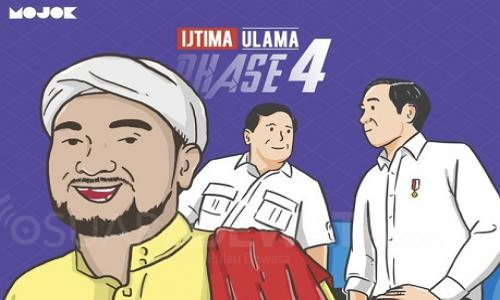Politically nuanced, Ijtima Ulama 4 does not need to be ignored
By: Muhammad Ridwan )*
The hustle and bustle of the presidential election has become a new historical record for the political world in Indonesia, the media crew seemed to not want to miss the whole action of the politicians and sympathizers of the candidates in maneuvering. Of course there are those who play smooth and some who play rough or provocative.
Many thought that after the presidential election was over, the political drama would be finished, but it turned out that it was not as easy as turning off a single blow candle. After meeting Prabowo and Jokowi which ended with eating satay together, some sympathizers from Kubu 02 seemed to show their anxiety, so they intended to hold the Ijtima ‘ulama 4.
Not only that PA 212 was initially enthusiastic in providing support to Prabowo, even threatening to leave the General Chairman of the Gerindra Party if Prabowo was willing to be “embraced” by Jokowi.
If that happens, then what’s the point of threatening? Why does PA 212 seem to like to threaten something? If this is the case, the question will arise, is there a certain motive for giving support to Prabowo?
Surely we have to agree that in politics we should not be too fanatical, as should be the case for a boxing match, even though they beat and hit each other but after the match is over the two fighters will hug each other and show mutual respect, not add to revenge.
This was also shown by Jokowi and Prabowo, where the two had an argument with each other, confronted each other’s arguments and made various efforts to win the people’s votes. Although there was tension, but both of them decided to remain friendly, that was what should be a model for the community.
The two largest Islamic organizations in Indonesia, NU and Muhammadiyah also agreed that the meeting between Jokowi and Prabowo was a positive step, especially if the public had long wanted reconciliation after the polarization that occurred during the 2019 Presidential Election.
If indeed the reconciliation has been completed, then why would Ijtima ‘ulama 4 be held, does PA 212 feel proud if Prabowo continues to be hostile to Jokowi. If this is the case, of course Ijtima ’Ulama 4 is an agenda that has the potential to treat the existing divisions.
In addition, if we go backwards, when the Islamic mass organizations so strongly want to push the agenda to replace the President, the more real is their intention to free Habib Rizieq from the law. They apparently had made the return of the FPI leadership to the homeland, especially as the mass organization that was very familiar with PA 212 was facing a dilemma about the possibility of not renewing their permit as a social organization.
Of course it is a mistake if organizations like FPI and PA 212 consider Prabowo to remain in the same line to guard the implementation of Islamic law, which will certainly leave deep disappointment when he learns that the political figure he relied on turns out to be bitter, and after all can not always be used as a vehicle for religious struggle.
Even though ulama are respected and respected figures, ulama are figures who have Islamic and scientific visions as heirs of the prophet. So that scholars should not need to enter too deeply in the realm of practical political interests.
If we look at NU, the implementation of the Ijtima is only to discuss fiqh and religious issues, not practical politics. NU will also expressly refuse to attend the Ijtima ’Ulama initiated by the PA 212.
The Ijitima Ulama could be a form of hatred for reconciliation between Jokowi and Prabowo. Even though the Presidential Election drama is over, all elements of society are expected to return to work according to their respective professions and activities.
We certainly can guess that Ijtima ‘Ulama 4 is an attempt to raise religious issues with disappointment with political contestation.
Though the Indonesian Ulema Council again called for the importance of maintaining a conducive situation for the nation and the state by all elements of the nation, especially Muslims who became the majority in Indonesia.
If Ijtima Ulama 4 is a form of disillusionment with peaceful efforts, surely we should question, are the ulemas who are members of Ijtima a figure who loves peace?
)* The author is a sociopolitical observer
